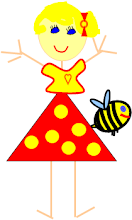Play is a natural part of a preschooler's learning process. To best facilitate this important part of a child's learning process, the teacher needs to consider...
The Environment: The environment should be rich with materials such as books, puzzles, blocks, cars, art supplies, dress-up clothes, toys, and other age-appropriate materials that children can freely explore while they are at play.
The Schedule: Preschoolers need an adequate amount of time for play. If young children are too rushed, then they will become discouraged and upset by the disruption in their process of play. If young children are given too much time, then they can get tired and irritable.
Peer Interaction: Preschoolers need time with others their own age or close to their own age to interact with. Playful interaction increases a young child's ability to develop socially and emotionally.
Adult Interaction: There are times when adults should interact with children as they play and there are times when adults should simply facilitate opportunities for children to play without adult interference.
When preschoolers are given the right environment, schedule, and social setting for play - the learning potential is at its best.
Be sure and Follow My Blog!
What can children learn through play?
Copyright © 2009 Deborah J. Stewart, All Rights Reserved!
The Latest on Teach Preschool!
Saturday, May 30, 2009
Designing for Play
Subscribe to:
Post Comments (Atom)


0 comments:
Post a Comment